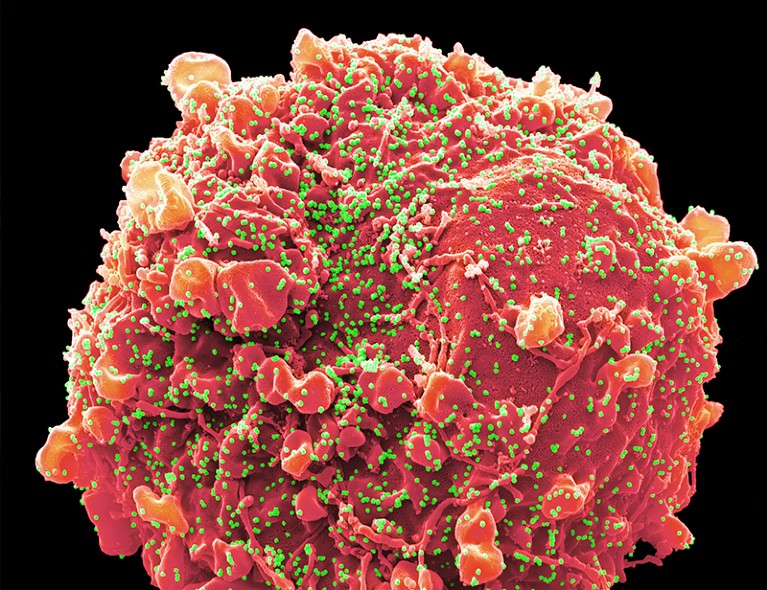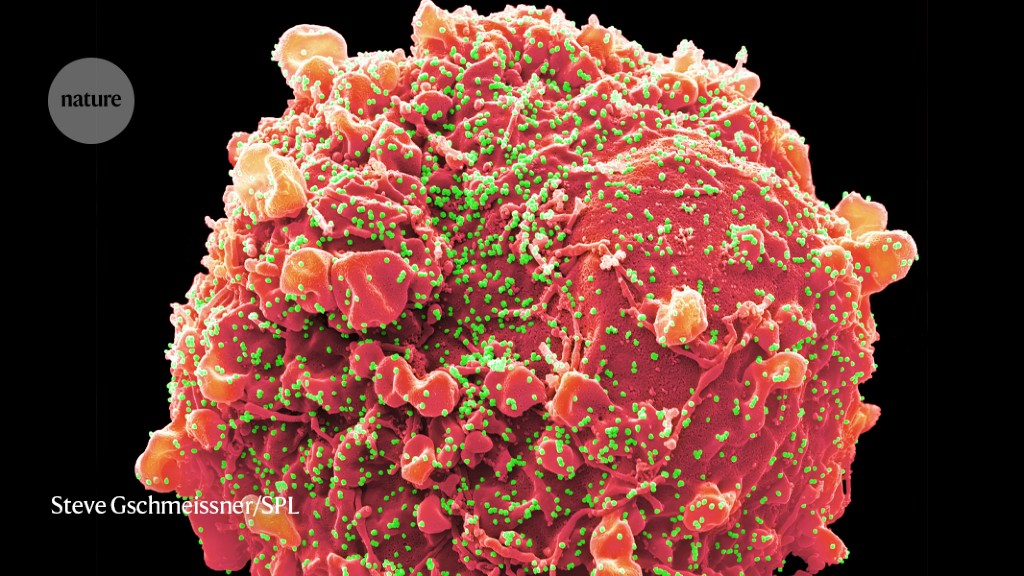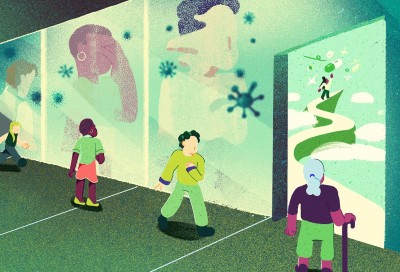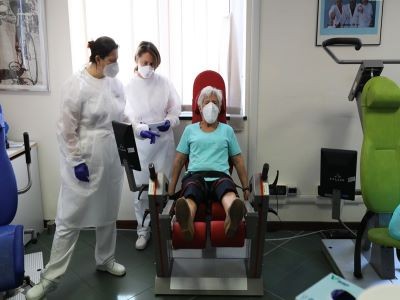
Particles of SARS-CoV-2 (green), the virus that causes COVID-19, on an infected kidney cell (red).Credit: Steve Gschmeissner/Science Photo Library
The first genome-wide hunt to find genetic risk factors for long COVID has yielded a hit: a DNA sequence near a gene called FOXP4, which is active in the lungs and in some immune cells.
The study, which was released as a preprint on 1 July1, used data collected from 6,450 people with long COVID across 16 countries. Researchers hope that this analysis will be just the beginning: a vast amount of data are required to unpick a disorder as complex as long COVID, which has been associated with more than 200 symptoms, including severe fatigue, nerve pain and difficulties with concentration and memory.
Long-COVID treatments: why the world is still waiting
“It’s very important that this type of study is being done,” says Chris Ponting, who studies medical bioinformatics at the University of Edinburgh, UK. “It will gain momentum and greater power as the case number increases.”
Such studies are early steps towards learning more about the causes of long COVID, says Stéphanie Longet, an immunologist at Jean Monnet University in Saint-Étienne, France, who has long COVID. “There are several key topics which are essential for patients, including treatments and prevention,” she says. “When causes, maybe multifactorial, [are] clearly understood, it will help to treat patients who will be more susceptible to develop long COVID and potentially prevent long COVID.”
Susceptibility genes
For more than three years, the global COVID-19 Host Genetics Initiative has been searching for DNA sequences that are associated with a risk of developing severe COVID-19. That hunt, which is ongoing, has implicated genes involved in the immune system and in allowing the SARS-CoV-2 virus to enter cells2.
The long-COVID study is a spin-off from that effort, says Hugo Zeberg, a geneticist at the Karolinska Institute in Stockholm and a lead author on the preprint. To study the condition, the team compiled data from 24 studies involving a total of nearly 6,500 people diagnosed with long COVID, as well as more than a million other participants who served as controls.
How common is long COVID? Why studies give different answers
In one analysis that combined data from 11 of those studies, researchers found a particular region of the genome that was associated with about 1.6-fold higher odds of developing long COVID. That segment of DNA is near a gene called FOXP4, which is active in the lungs and other organs. The variant linked to long COVID is also associated with higher expression of FOXP4 in lung cells.
Previous research has linked the same gene to an increased risk of severe COVID-19, and Zeberg and his colleagues found that it is also associated with lung cancer. Although having severe COVID-19 increases the risk of developing long COVID, the team found that the contribution of the DNA variant to long-COVID risk was too large to be explained by its link to severe COVID-19 alone. “This variant has a much stronger impact on long COVID than its impact on severity,” says Zeberg.
Replicating that finding in other data sets would help to strengthen the study’s conclusions, says Zhongshan Cheng, a bioinformatician at St. Jude Children’s Research Hospital in Memphis, Tennessee. Much of the data used in the long-COVID analysis was also used in the analysis that found a link between FOX4P and severe COVID-19, he notes. Fresh data would help to rule out the possibility that other factors, such as lung cancer, could have influenced the apparent association with FOX4P.
More to come
Even so, the study is a breakthrough, Cheng says, and future studies will probably add to the list of genetic risk factors for long COVID.
“It won’t just be a single answer, there will be a whole variety of people’s vulnerabilities contributing to why they haven’t recovered from COVID,” says Ponting. He and his colleagues proposed a study that would have included DNA from 15,000 people with long COVID. But grant reviewers rejected the proposal, he says, because they thought the condition too complex to be dissected in the way Ponting’s team suggested.
“I disagree,” he says. “It is very complicated, but also very important to pick apart. The health and socio-economic costs of long COVID are enormous.”









More News
Author Correction: Stepwise activation of a metabotropic glutamate receptor – Nature
Changing rainforest to plantations shifts tropical food webs
Streamlined skull helps foxes take a nosedive